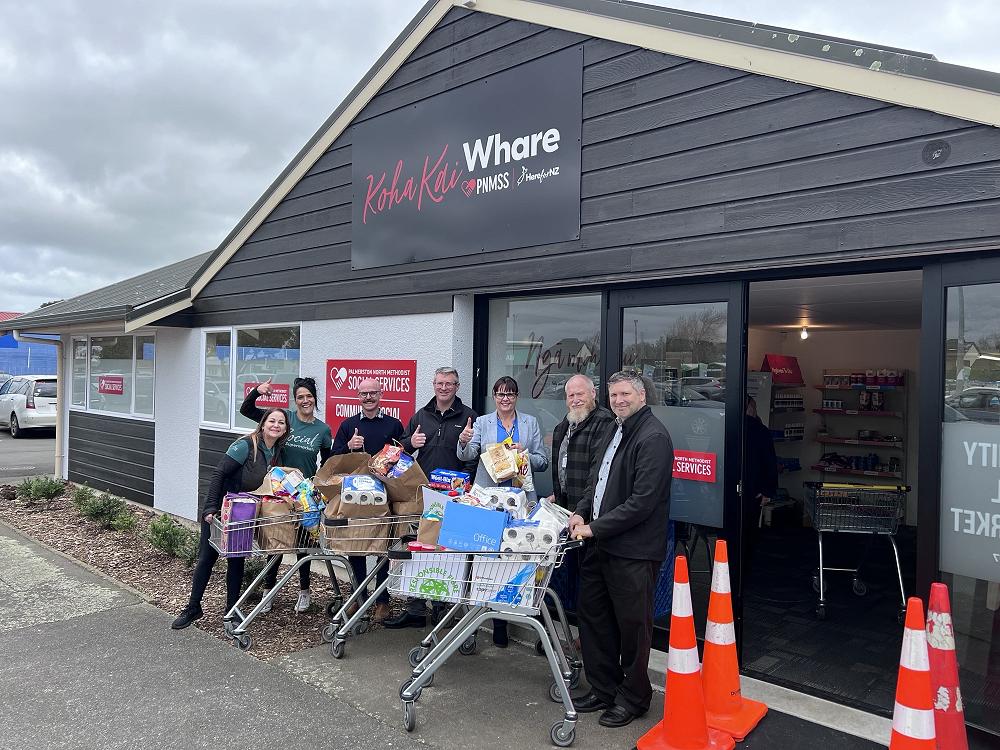
A Whirl of Activity in Palmerston North
Shortly after Rik TeTau, Ngāti Kahungunu, took on the role as General Manager of the Palmerston North Methodist Social Services PNMSS, we interviewed him for the July 2022 issue of Touchstone. At that time, he said he was “looking for a challenge in an environment that truly cared and supported community and each other.” Since that interview, Rik and his team – 11 paid staff and 13 volunteers - have had a major impact on the local community with a range of increased and enhanced social services, including a social supermarket that is helping to fill pantries and restoring the mana of the many working families who are registering to visit.
Rik says his team cannot keep up with the extraordinary success of the social supermarket. There are currently 75 families and individuals enrolled for the service with bookings in place until well into 2024. “We could do more, but we don’t have the capacity or resource,” Rik says. The service differs from a foodbank as users choose their purchases based on their personal circumstances and preferences, and they make a financial contribution to offset the costs of the products selected. Users shop privately and with dignity as they select groceries from premises that resembles a regular supermarket.
Rik first saw the concept rolled out in Sydney some years ago and responded when the opportunity arose last year to roll out the venture in Palmerston North. In a deal negotiated with Foodstuffs, the shelves are stocked with a wide variety of products purchased at a discounted price. Registered users are allocated points depending on the number of people in the household they are supporting, and they make a financial contribution to offset the costs to PNMSS.
Rik says the feedback has been amazing. “People come in with big smiles. This is mana-enhancing for people as they don’t have to beg.” He admits to being proud of, and humbled by the success of the service that is equally popular with his staff, volunteers and the community using the service. Registered users typically call in once a month although large households may split their points allocations and visit twice a month depending on the volume of food required. Registration is a deliberately uncomplicated process. “Nothing drilling,” Rik says.
Rik says they are seeing many new clients who are different to the people who depend on foodbank services. “We are seeing a move away from families who live on benefits. We are seeing working families and 90 percent are new clients. The cost-of-living crisis is hurting everyone.” A ‘recipe club’ initiative is popular and helps with meal planning as ingredients for a meal and a recipe are provided in exchange for points.
Beyond the social supermarket, a kai box is available for anyone passing and payment is by koha. “Some people give our staff a hug, someone else might offer to vacuum the floor or clean the toilet. We don’t allocate the food that is available in the kai box. People just pick what they want, and others bring contributions. People using the service are also supporting the service.”
In the whanau room, food is available for everyone visiting. Many people arrive with food to share, including social supermarket users who want to show their gratitude by contributing to others.
Now that the social supermarket is operating so successfully, Rik is eyeing new initiatives although he concedes his team might benefit from a break. “Its been a bit of a tornado since I arrived. My excitement comes from setting something up. Once it’s up and running, I look for something new.”
